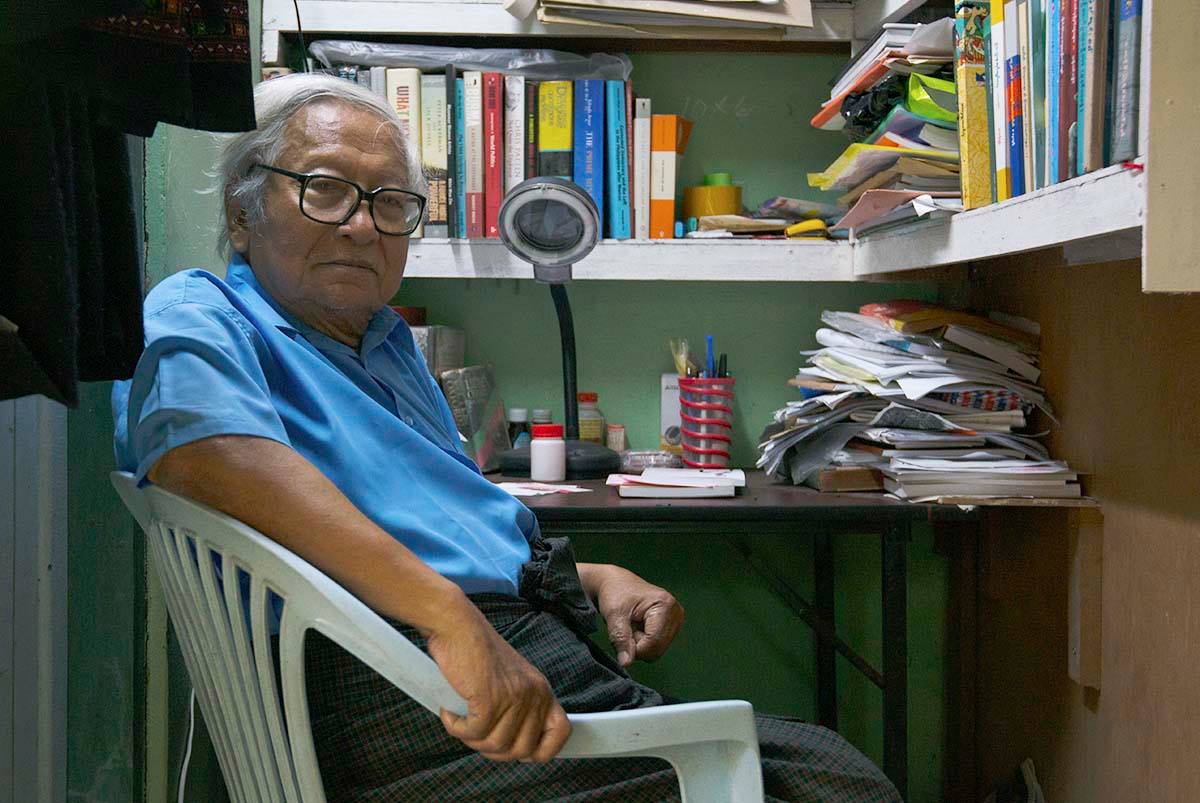It has been two years since Win Tin, Burma’s hardest-working soldier in the decades-long struggle against brutal military rule, went to his final resting place.
In our current era, no one has sacrificed more for his beliefs. His courage and patience in the face of brutal persecution was matched only by his deeply-held sympathy for the country’s oppressed people.
I believe it is the duty of all of us to continue his tireless work, until Burma has finally created the kind of society that he gave his life for. And there can be no better way of achieving this goal than making Win Tin’s life story an important part of our schools’ curriculum.
One of the crucial functions of education is to teach students which standards and values are most worth preserving. Giving them a chance to learn about remarkable individuals like Win Tin provides them not just with role models, but with a sense of connection to the past.
It is very rare to find a famous person whose life is without controversy, but there is no better way for the young to deepen their appreciation of the sacrifices and advances of previous generations than by providing them with an example of a great man or woman who embodies the highest ideals.
Through his steadfastness in sticking to his principles, Win Tin demonstrated courage, intelligence, honesty, a sense of duty and a complete lack of self-interest. Few would ever dare to walk in his footsteps, but by showing the way for future generations, he is a shining example of the kind of person we should all aspire to be.
It was as a journalist, rather than as a political figure, that he honed the qualities that would make him a man of such rare integrity.
“You should devote as much time as you can to reporting the news,” he said. “I don’t think it’s important to make money or to become famous. Just work with all your heart and mind. If you don’t give your heart and soul to this work, you will not be a good journalist.”
For Win Tin, journalism wasn’t just a job — it was nothing less than the pursuit of truth and justice. “You must be prepared to sacrifice your life for the truth. And you should know that there is such a thing as justice. Always try to be on the side of justice, and always be ready to expose and fight injustice.”
These are words that he spoke not long before he died, but they sustained him throughout his entire life, including the many long, dark years that he spent in prison, suffering inhuman treatment for the sake of his commitment to truth and justice. As “Hintharwaddy U Win Tin”, he wrote with clear-sighted conviction, always analysing Burma’s social conditions through the lens of truth and justice. Until the day he died, that was how he saw the world.
As journalists and educators, we must do everything in our power to keep his memory alive, to ensure that young people for many generations to come know his name and what he stood for.
It’s true, of course, that Win Tin did not consider himself a remarkable person. Indeed, when he spoke of loss and sacrifice, he always spoke of others:
“There are so many names we never hear of, unsung heroes who lost their lives. Some were young people who went abroad, whose lives were destroyed. Perhaps they had a chance to eat good food there or get an education, but still, they had to leave their families, their motherland. That’s why I say their lives were destroyed. But the same is true for so many others — merchants, farmers, students. When so many have lost so much, none of us can claim to be a hero.”
If you asked him about his contribution to Burma’s political struggle, he would say that he was “a solider of the movement”, not a leader. And like a soldier who had lived through hell, his first thoughts were always for his comrades still on the battlefield, not for himself. For Burma’s man in blue, who never stopped wearing the blue prison shirts that showed his solidarity with those still behind bars, the war would never be over until there was freedom for all.
In a country where the military stripped citizens not only of their freedom, but also tried to deprive them of their dignity as human beings, Win Tin was a humble hero — perhaps not the only one among the millions who strove to live decent lives in indecent times, but certainly one whose memory deserves to be cherished.
[related]
After five decades of military rule, the people of Burma will have to relearn what it means to have freedom. Above all, it means accepting responsibility, for oneself and for others. It also means safeguarding democracy and respecting human rights. These are things that our previous rulers stripped out of the curricula of our schools, and that must now be restored to their rightful place at the heart of our system of education.
And what better teacher could we hope for than Win Tin to instruct us in these precious values? This is why I believe that every school should have a “Blue Hero” museum, and every student should receive lessons in citizenship that include the life story of Win Tin, a man who legacy deserves to be remembered forever.



